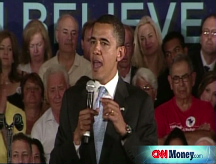Decoding Obama's tax claim
The Democrat says John McCain won't offer tax relief to 'more than 100 million Americans.' Really? Myths, Half-Truths and the Facts - a new CNNMoney.com feature - gets to the bottom of it.
NEW YORK (CNNMoney.com) -- There are only about 1,500 hours to go before Election Day. And that's also about how many times you'll hear snappy sound bites about the economic proposals of John McCain and Barack Obama.
Over the next nine weeks, CNNMoney.com will help you sort through the claims. We'll try to sort fact from fiction and truth from exaggeration - or just clue you in on what the candidates are really talking about.
The first part in the series: Just how much tax relief is McCain offering?
The claim: To hear Obama tell it, McCain isn't proposing "one penny of tax relief to more than 100 million Americans."
The Obama campaign says it bases that number on McCain's proposal to increase the exemption tax filers take for dependents, and adds that it is the "only middle-class tax cut" the Republican nominee has offered.
The top line: It depends on what you mean by tax relief and what you mean by "only." But Obama's claim isn't as far-fetched as it sounds, keeping in mind that projections about tax effects are not carved in stone.
The facts: McCain has made several tax proposals. One of them is the dependent exemption increase.
Obama gets to his "more than 100 million" charge primarily from an analysis that two Harvard researchers did for the campaign. They examined 2004 tax return data from the IRS and estimated that 101 million tax returns would not benefit from the increase to the exemption in 2009. That represents more than 140 million people. The Obama campaign claims that number is actually low because the data did not include non-filers.
The Tax Foundation, a group unaffiliated with the Obama campaign, reached a similar conclusion.
So which Americans would see no benefit from McCain's proposal? People without dependents, of course, and those who don't make enough money to file or to owe enough federal income tax to benefit fully from the exemption.
At the same time, the Obama camp is pushing it when it claims that the exemption increase is the "only" middle class tax break McCain offers.
Douglas Holtz-Eakin, McCain's senior economic adviser, said some of the folks who don't get a break from the dependent exemption could benefit from McCain's proposal to change how money spent on health insurance is taxed.
Today, if you buy a policy on your own, you don't get any tax break. If your employer subsidizes your premiums, that money is considered tax-free to you.
Under McCain's plan, that subsidy would become taxable income. But anyone who buys insurance would receive a refundable tax credit worth $2,500 per person ($5,000 per family). That's a dollar-for-dollar reduction of your tax bill, or, if you don't have a tax bill, a dollar-for-dollar increase in the amount of money Uncle Sam would send your way.
Certainly, the health care credit would provide a new tax break for anyone who buys insurance on their own. Whether the credit would be a boon for those who get insurance through their employer depends, among other things, on the cost of their plans, the amount their employer contributes and their income tax rate.
The Tax Policy Center, in a preliminary analysis of McCain's health plan, said the credits are larger than the current premiums for the most generous group health plans. So initially it may be a break for many. But over time, experts say, the value of that credit will go down since it's not likely to keep pace with the rising health care costs.
Holtz-Eakin also said that some of the households without dependents could get tax relief because of McCain's proposal to permanently "patch" the Alternative Minimum Tax. The so-called wealth tax, left unaddressed, would hit an increasing number of middle- and upper-middle-income families. While Congress has been patching the AMT every year, McCain's proposal would be more of a super-patch.
The Republican nominee has also proposed to make permanent the 2001 and 2003 tax cuts, which would otherwise expire by 2011. Even critics of those cuts, however, expect lawmakers to keep many in place.
The bottom line: It's not fair to say that McCain's dependent exemption proposal is his "only middle-class tax cut." But Obama's claim that "more than 100 million Americans" will be left out of tax relief under McCain seems to be in the ballpark.
When the Tax Policy Center, which has analyzed both candidates' tax plans, considered McCain's proposals as a whole minus his health care plan, it estimated that 66 million tax "units" - or 78 million people - would still not see tax relief next year. Add their kids and Cousin Itt upstairs, and you get closer to that 100 million number Obama touts.
But one caveat: The numbers are expected to fall once researchers incorporate the effects of McCain's health care credit, which they expect to do in the coming weeks. ![]()







